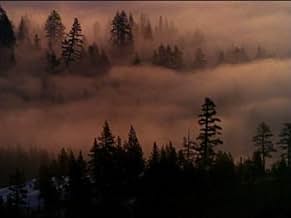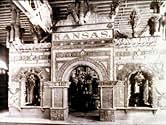The West
- TV Mini Series
- 1996
- 1h
IMDb RATING
8.4/10
2.3K
YOUR RATING
Stephen Ives' "The West" is a PBS 4-Video Series co-produced by Ken Burns: - "Death Runs Riot" 85 min. - "Fight No More Forever" 85 min. - "Ghost Dance" 58 min. - "The People" 82 min.Stephen Ives' "The West" is a PBS 4-Video Series co-produced by Ken Burns: - "Death Runs Riot" 85 min. - "Fight No More Forever" 85 min. - "Ghost Dance" 58 min. - "The People" 82 min.Stephen Ives' "The West" is a PBS 4-Video Series co-produced by Ken Burns: - "Death Runs Riot" 85 min. - "Fight No More Forever" 85 min. - "Ghost Dance" 58 min. - "The People" 82 min.
- Awards
- 1 win & 2 nominations total
Browse episodes
Featured reviews
I had looked forward to the series as coming from a master of the documentary form. After all, Burns set in motion several documentary devices that have been widely copied since, such as first-person voice-over narration and having the narrator sign off each spoken part with his or her name. The Civil War series was truly an achievement.
This thing, however--
It amounts to a chapters-long indictment of Europeans that verges on racism. It emerges after a while that the only good whites are dead whites. It's true that there was much brutality in white settlement of the west, and that horrible crimes were committed, usually unthinkingly, and many of them by whites. But is there really nothing more to the story than white-folks-bad/red-folks good? With a little effort, Ken Burns might have found, oh, I don't know, at least one good white person. Or, rather, one good white person who wasn't immediately tarred and feathered by his redneck fellows.
It's as if you were to tell the story of World War II and focus on nothing but the fact that the American armed forces were rigidly segregated at the time. Oh, wait, that one's probably Ken Burns' next.
This thing, however--
It amounts to a chapters-long indictment of Europeans that verges on racism. It emerges after a while that the only good whites are dead whites. It's true that there was much brutality in white settlement of the west, and that horrible crimes were committed, usually unthinkingly, and many of them by whites. But is there really nothing more to the story than white-folks-bad/red-folks good? With a little effort, Ken Burns might have found, oh, I don't know, at least one good white person. Or, rather, one good white person who wasn't immediately tarred and feathered by his redneck fellows.
It's as if you were to tell the story of World War II and focus on nothing but the fact that the American armed forces were rigidly segregated at the time. Oh, wait, that one's probably Ken Burns' next.
Burns and Ives combine to produce a work that's very much up to Ken Burns' standards. As a viewing experience, it's everything you'd expect.
And then there's the content.
Much has been made about the supposed bias of Burns' presentation of the history of the west. A lot of time was spent on the way the US treated the indigenous populations, on the crimes of the US military, on the theft of lands, and the systematic attempts to eradicate native cultures. The loss of the age before white settlement is lamented.
Is this a balanced perspective? Maybe not, although I don't think it's as biased as other reviews would have you believe. The triumphs of the west are told as well as the losses. Not all whites are painted as evil, nor are all natives painted as innocent. Events are often just told as they happened, and the viewer is left to draw their own conclusions. A lot of the content doesn't concern native Americans at all.
More important that all of that, however, is that it's a story that needs telling. Americans have been indoctrinated with romantic fictions about the west for over a century. Giving Burns a chance to tell the other side of the story doesn't seem too much to ask. A few Hollywood movies that paint the indigenous people of America before westward expansion as noble savages - also a pleasant fiction, incidentally - does not make up for a century of bias, misinformation, and outright lies taught to American schoolchildren. What's worse is that for the most part, these fictions are still taught to American schoolchildren.
At nearly nine hours, The West is an experience that will take up several of your evenings, but it's nine hours that may change the way you think about American history.
And then there's the content.
Much has been made about the supposed bias of Burns' presentation of the history of the west. A lot of time was spent on the way the US treated the indigenous populations, on the crimes of the US military, on the theft of lands, and the systematic attempts to eradicate native cultures. The loss of the age before white settlement is lamented.
Is this a balanced perspective? Maybe not, although I don't think it's as biased as other reviews would have you believe. The triumphs of the west are told as well as the losses. Not all whites are painted as evil, nor are all natives painted as innocent. Events are often just told as they happened, and the viewer is left to draw their own conclusions. A lot of the content doesn't concern native Americans at all.
More important that all of that, however, is that it's a story that needs telling. Americans have been indoctrinated with romantic fictions about the west for over a century. Giving Burns a chance to tell the other side of the story doesn't seem too much to ask. A few Hollywood movies that paint the indigenous people of America before westward expansion as noble savages - also a pleasant fiction, incidentally - does not make up for a century of bias, misinformation, and outright lies taught to American schoolchildren. What's worse is that for the most part, these fictions are still taught to American schoolchildren.
At nearly nine hours, The West is an experience that will take up several of your evenings, but it's nine hours that may change the way you think about American history.
10AlexMI
Unique, amazing, massive project thoroughly documenting the expansion of the United States into the vast territories of the American WEST. Brutally honest, sympathetic insight into the fall of the many Native American peoples... some of the material is painful, sometimes bleak, but an absolute MUST SEE for any feeling person with even a passing interest in the history of America. Outstanding photography and the classic Ken Burns look & feel (executive & senior producer), but with director Stephen Ives' own insightful point-of-view. This series ranks right along side Burns' "Civil War" in scope and depth, IMHO. See it anyway you can, then demand the set on DVD! (DVD not available at this writing).
The history of 'The West', the area of the United States west of the Missouri River, from the 16th century to the early 1900s.
Interesting documentary series. Well-researched, with some great detail. Doesn't cover just bigger-picture history but also some of the micro stuff, the lives of everyday people involved.
While the facts are interesting, this negated to some extent by the editorial bias. Instead of just giving the history, the writers decided to centre the series on the native Americans. This means that the common theme is that the white/US expansion into the west is bad and that whites are evil. You can sense the delight in Peter Coyote's voice as he details Custer's Last Stand.
Covering the native American perspective was necessary but it didn't have to be the only perspective or a good vs bad, us vs them sort of thing. This focus extends into everything, including the intro theme, the music of which became very irritating, very quickly, yet got played ad nauseam in the series.
In addition, the one thing most people would have looked for in this series was stories of famous gunslingers and outlaws from the late-1800s. There's a brief mention of people like Wyatt Earp and Doc Holiday, but that's it. This is consistent with a comment towards the end of the series that the actual West wasn't as glamourous or action-packed as Hollywood makes it out to be. This is true, but they could still have covered some of that history.
Overall, worth watching for a detailed history of the West. Just don't expect stories of gunslingers or a balanced approach to history.
Interesting documentary series. Well-researched, with some great detail. Doesn't cover just bigger-picture history but also some of the micro stuff, the lives of everyday people involved.
While the facts are interesting, this negated to some extent by the editorial bias. Instead of just giving the history, the writers decided to centre the series on the native Americans. This means that the common theme is that the white/US expansion into the west is bad and that whites are evil. You can sense the delight in Peter Coyote's voice as he details Custer's Last Stand.
Covering the native American perspective was necessary but it didn't have to be the only perspective or a good vs bad, us vs them sort of thing. This focus extends into everything, including the intro theme, the music of which became very irritating, very quickly, yet got played ad nauseam in the series.
In addition, the one thing most people would have looked for in this series was stories of famous gunslingers and outlaws from the late-1800s. There's a brief mention of people like Wyatt Earp and Doc Holiday, but that's it. This is consistent with a comment towards the end of the series that the actual West wasn't as glamourous or action-packed as Hollywood makes it out to be. This is true, but they could still have covered some of that history.
Overall, worth watching for a detailed history of the West. Just don't expect stories of gunslingers or a balanced approach to history.
This documentary mini-series does a decent job of covering such a huge, complex subject in 9 episodes (about 10 hours of time). I like that appropriate focus and time given to American Indians, who played such a crucial role in the story, and to other groups like Latinos, blacks, and Chinese immigrants who played vital roles, as well.
(I'm also offended by a number of reviewers who complain that too much screen time is given to Indians and minorities. These same reviewers complain that whites aren't credited enough for their courage and virtues in subduing the "wild west" and "civilizing" the Indians. The irony is that these reviewers are the very sort of racist people who caused so much trouble and misery while the real history was being played out!)
On the whole, I do recommend watching this mini-series.
(I'm also offended by a number of reviewers who complain that too much screen time is given to Indians and minorities. These same reviewers complain that whites aren't credited enough for their courage and virtues in subduing the "wild west" and "civilizing" the Indians. The irony is that these reviewers are the very sort of racist people who caused so much trouble and misery while the real history was being played out!)
On the whole, I do recommend watching this mini-series.
- How many seasons does The West have?Powered by Alexa
Details
- Release date
- Country of origin
- Official site
- Language
- Also known as
- Запад
- Filming locations
- Production companies
- See more company credits at IMDbPro
- Runtime
- 1h(60 min)
- Color
- Sound mix
- Aspect ratio
- 4:3
Contribute to this page
Suggest an edit or add missing content



































